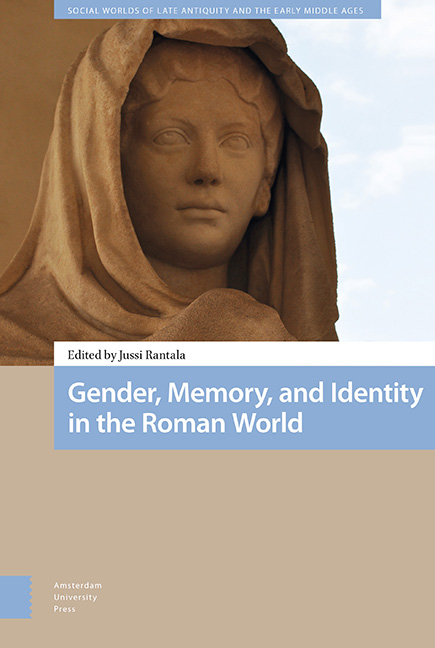Book contents
- Frontmatter
- Contents
- List of Illustrations
- Abbreviations
- Preface
- Tabula Gratulatoria
- Introduction
- 1 Public Agency of Women in the Later Roman World
- 2 Religious Agency and Civic Identity of Women in Ancient Ostia
- 3 The Invisible Women of Roman Agrarian Work and Economy
- 4 ‘Show them that You are Marcus’s Daughter’
- 5 Defining Manliness, Constructing Identities
- 6 ‘At the Age of Nineteen’ (RG 1)
- 7 Conflict and Community
- 8 Dress, Identity, Cultural Memory
- 9 The Goddess and the Town
- 10 Varius, multiplex, multiformis – Greek, Roman, Panhellenic
- 11 Mental Hospitals in Pre-Modern Society
- Index
2 - Religious Agency and Civic Identity of Women in Ancient Ostia
Published online by Cambridge University Press: 20 November 2020
- Frontmatter
- Contents
- List of Illustrations
- Abbreviations
- Preface
- Tabula Gratulatoria
- Introduction
- 1 Public Agency of Women in the Later Roman World
- 2 Religious Agency and Civic Identity of Women in Ancient Ostia
- 3 The Invisible Women of Roman Agrarian Work and Economy
- 4 ‘Show them that You are Marcus’s Daughter’
- 5 Defining Manliness, Constructing Identities
- 6 ‘At the Age of Nineteen’ (RG 1)
- 7 Conflict and Community
- 8 Dress, Identity, Cultural Memory
- 9 The Goddess and the Town
- 10 Varius, multiplex, multiformis – Greek, Roman, Panhellenic
- 11 Mental Hospitals in Pre-Modern Society
- Index
Summary
Abstract
The paper deals with women's participation in various cults of Ostia, the harbour city of the ancient Rome. The paper is based on the rich epigraphic and archaeological evidence on religious life of Ostia. The focus is on the Late Republican and, particularly, in the Early Imperial era, as the majority of the surviving evidence dates from the second century CE. The main question of the paper is the role of religious activity in the construction of women's civic identity. Furthermore, the significance of religion in the way women's memory was immortalized is studied. Women's social standing, family background and marriage is also paid attention to. The final aim is an attempt to define women's religious agency in the urban society of Ostia.
Keywords: agency, identity, Ostia, religion, women
Introduction
My paper deals with women in Ostia, the harbour city of ancient Rome, and their activity in the religious life of this city before the Christianization of the Roman Empire. During the Early Imperial era, in particular, Ostia was characterized by its cosmopolitan population. This feature was largely due to the Imperial harbours built in the first century CE. They made Ostia the gateway for all kinds of goods to the capital of the Empire. People from all over the Roman world resided temporarily or permanently in Ostia and its neighbour Portus. The ethnically and socially varied population also meant there was a great variety of religious cults in Ostia. There were traditional cults dating back to the early history of the colony of Ostia and cults linked with the city of Rome. On the other hand, there were cults brought by the newcomers. It is worth asking what the role of religion in building one's identity was in this kind of urban environment. By the second century ce, freedmen had become a large, active, and influential social group in Ostia, visible in religious life, too. In this article, I am trying to find women's place in this multifaceted picture.
The main question of the paper is the role of religious activity in the construction of women's civic identity. By civic identity I mean the ways in which an individual understood their place and role in the community.
- Type
- Chapter
- Information
- Gender, Memory, and Identity in the Roman World , pp. 63 - 88Publisher: Amsterdam University PressPrint publication year: 2019



